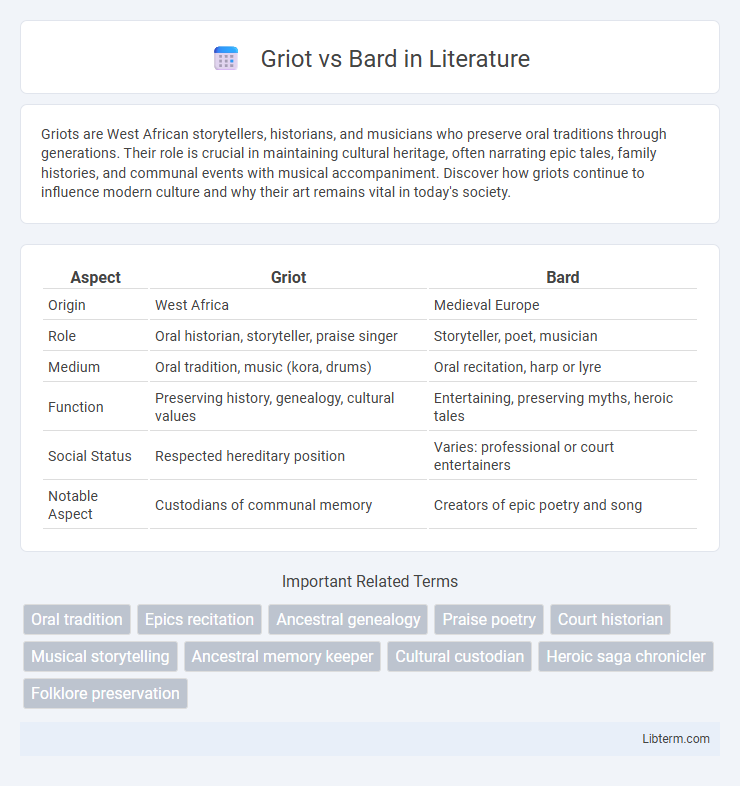Griots are West African storytellers, historians, and musicians who preserve oral traditions through generations. Their role is crucial in maintaining cultural heritage, often narrating epic tales, family histories, and communal events with musical accompaniment. Discover how griots continue to influence modern culture and why their art remains vital in today's society.
Table of Comparison
| Aspect | Griot | Bard |
|---|---|---|
| Origin | West Africa | Medieval Europe |
| Role | Oral historian, storyteller, praise singer | Storyteller, poet, musician |
| Medium | Oral tradition, music (kora, drums) | Oral recitation, harp or lyre |
| Function | Preserving history, genealogy, cultural values | Entertaining, preserving myths, heroic tales |
| Social Status | Respected hereditary position | Varies: professional or court entertainers |
| Notable Aspect | Custodians of communal memory | Creators of epic poetry and song |
Understanding the Griot: Origins and Roles
The griot is a West African storyteller, historian, and musician whose origins trace back to ancient Mali and neighboring regions. Serving as oral historians, griots preserve genealogies, cultural traditions, and historical narratives through music and poetry. Their role extends beyond storytelling to include mediating conflicts, advising leaders, and maintaining the collective memory of their communities.
The Bard: History and Significance
The bard, a key figure in medieval European culture, served as a poet, storyteller, and musician who preserved oral histories and genealogies. Known for their mastery of language and song, bards were entrusted with entertaining nobility and chronicling heroic deeds, often influencing social and political narratives. Their significance lies in the preservation of cultural heritage and the shaping of collective memory through oral tradition.
Cultural Contexts: West Africa vs. Europe
Griots in West Africa serve as oral historians, musicians, and storytellers preserving the histories and genealogies of families and communities through generations. Bards in Europe, particularly in Celtic cultures, functioned as poets, musicians, and cultural narrators who celebrated heroic deeds and royal lineages. Both roles are integral to their societies' cultural identity, with griots emphasizing communal memory and bards highlighting individual heroism and mythology.
Storytelling Traditions Compared
Griots and bards represent distinct storytelling traditions rooted in West African and Celtic cultures, respectively, each serving as custodians of oral history, music, and poetry. Griots function as historians, praise singers, and musicians, preserving genealogies and cultural narratives using instruments like the kora, while bards traditionally blend poetry and song to recount legends and heroic deeds within European societies, often accompanying themselves on the harp. Both roles emphasize oral transmission of heritage but differ in their cultural contexts, performance styles, and societal functions, reflecting the unique historical and artistic values of their regions.
Instruments and Performance Styles
Griots traditionally perform with the kora, a 21-string lute-bridge-harp, and the balafon, a wooden xylophone, delivering storytelling through rhythmic accompaniment and vocal techniques rooted in West African oral history and praise singing. Bards typically utilize the harp or lute-like instruments such as the lyre or psaltery, blending music with poetic recitation and epic narrative performances found in medieval European cultures. The griot's style emphasizes communal engagement and historical preservation, while the bard's performance often centers on heroic tales and courtly entertainment.
The Role of Oral History
Griots and bards both serve as vital oral historians, preserving cultural heritage through storytelling, music, and poetry in West African and European traditions, respectively. Griots maintain genealogies, historical narratives, and societal values within Mandinka and other West African communities, often performing at ceremonies and communal gatherings. Bards in medieval Europe functioned as professional poets and musicians who conveyed heroic tales, legends, and historical events, reinforcing cultural identity and cohesion through oral transmission.
Social Status and Influence
Griots hold a prestigious social status within West African communities as hereditary musicians, storytellers, and historians who preserve oral traditions and influence political and social affairs. Bards, primarily rooted in Celtic cultures, serve as revered poets and musicians whose performances bolster social cohesion and honor tribal heritage, though their influence often centers around entertainment and cultural expression rather than direct political counsel. Both roles command respect, yet griots typically possess more direct influence over leadership decisions due to their historical function as advisors and genealogists.
Language and Poetic Forms
Griots use Manding languages and perform in a call-and-response style deeply rooted in West African oral tradition, employing praise poetry and historical narratives. Bards utilize Old English, Old French, or Celtic languages, composing epic poetry and lyrical verse that often follow strict metrical patterns like alliteration or rhyme. Both traditions emphasize storytelling through unique linguistic frameworks and distinct poetic structures that preserve cultural heritage.
Modern Adaptations: Griot and Bard Today
Modern adaptations of griots and bards emphasize their evolving roles as cultural historians and storytellers in contemporary settings. Griots integrate digital media to preserve West African oral traditions, while bards often perform at festivals and use social platforms to share folklore and music. Both figures maintain their heritage significance through innovative storytelling methods that engage global audiences.
Legacy and Impact on Contemporary Culture
Griots are West African oral historians who preserve genealogies, historical narratives, and musical traditions, deeply influencing the cultural identity of communities across countries like Mali, Senegal, and Guinea. Bards, originating from Celtic regions, primarily in Ireland and Wales, serve as poets and musicians who celebrate heroic deeds and sustain the mythology and social values of their societies. Both traditions have significantly impacted contemporary culture through modern music, literature, and performances that revive ancient storytelling methods, ensuring the endurance of collective memory and cultural heritage.
Griot Infographic

 libterm.com
libterm.com